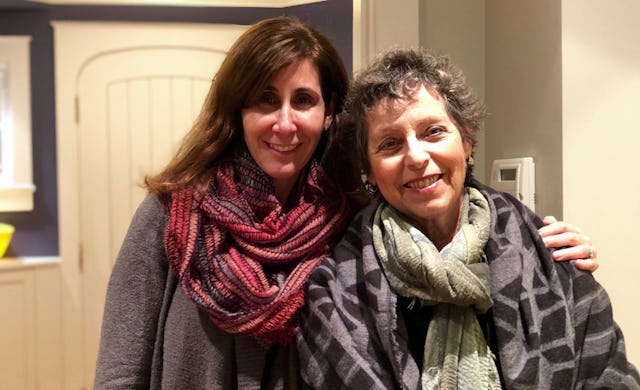Why We Should Give Cancer Patients All The Marijuana They Want

Cancer sucks.
If you undergo chemotherapy, you willingly poison your entire body to kill that effing cancer. And when you do that, your body will protest. There is pain and nausea. There is weight loss and loss of appetite. There is an ever-present fatigue and a weakened immune system. Your hair sometimes falls out. Your feet sometimes swell. Your memory will sometimes disappear like the Golden Gate Bridge on a foggy day. Some days you’ll feel a chill in your bones that you just can’t shake – even in the heat of summer.
I know this not because I’ve experienced it, but because too many people I love are battling or have battled cancer. My uncle is undergoing treatment for pancreatic cancer and my mother-in-law for ovarian. Cancer treatment’s nasty side effects are no joke. I’ve watched my uncle steadily lose 10, 20 and then 30 pounds because the cancer-fighting drugs make it impossible for him to eat. I’ve seen my mother-in-law slowly cross a room on her painfully swollen feet.
Yes, they are on a cocktail of anti-nausea pills and medications meant to combat these awful side-affects and, yes, sometimes these FDA-approved medicines help. But sometimes they don’t. Almost everyone I know who’s suffered from cancer says there’s an additional remedy that helps soothe many of their symptoms: marijuana.
“I wouldn’t get through the nights without it,” says my mother-in-law, Sara. “It helps me sleep through the soreness and queasiness.”
Whether you’re comfortable with it or not, weed is a drug that offers cancer sufferers relief not only from pain, but also nausea, sleeplessness and anxiety. Research shows that cannabis relieves cancer treatment’s side affects. Tetrahydrocannabinol (THC) taken by mouth is proven to alleviate nausea and vomiting, increase appetite, decrease pain as effectively as codeine, ease anxiety and improve overall mood.
Yet cancer patients still have a hard time accessing the medical marijuana they need, even in states where it’s legal. This is especially troubling when pharmaceuticals simply do not work, but another one is prescribed. Having seen people I love suffer through cancer, I’d even argue that ignoring cannabis as an option is mighty close to violating the Hippocratic oath of “do no harm.”
Medical marijuana is legal in 29 states plus Washington, D.C., so you’d think it’d be a no brainer for doctors to assist patients who want to use it. In some states, like Washington, where medical pot use was legalized 20 years ago, one study showed that cancer patients there use marijuana when undergoing cancer treatment more often than patients in states where it is not yet legal. However, even in states where medical marijuana use is legal, patients still are not using it as a regular treatment.
So what gives?
First, people are confused about how to get a medical marijuana card. Second, once they do get one, they don’t know which type of weed to use. With legalization happening in so many states, dispensaries are now selling a broad range of products. There are edibles, vapors, or straight-up leaf and the concentration of active ingredient is different in all of them. Some products contain just cannabidiol (CBD), which helps with sleep, for example, and not the mind-altering psychoactive ingredient tetrahydrocannabinol (THC). While the lovely people behind the bar can describe what’s what, they can’t make medical recommendations. Plus, different people respond differently to different doses of any drug, legal or not.
Finally, oncologists don’t always bring up marijuana as an option. My mother-in-law, who is being treated at Dana-Farber Cancer Institute in Boston, says her doctors, while wonderful when it comes to fighting the cancer itself, did not help her navigate the world of medical marijuana to alleviate her side affects. This could be because they themselves don’t know enough about how the drug works and don’t feel comfortable prescribing it. It could also be because, even though marijuana use is legal in certain states, growing and distributing it is not legal under federal law. And it certainly doesn’t help to have U.S. Attorney General Jeff Sessions calling for state U.S. Attorneys to aggressively prosecute marijuana growers and distributors, despite state legalization. It’s absolutely maddening, I tell you.
As Dr. Jordan Tischler, who runs medical cannabis clinics in Massachusetts, said in an interview with radio station WBUR, “Most of those institutions [medical centers] are prohibited and/or afraid of the prohibitions from the federal government, so have opted not to pursue this within their domain.”
From what I can tell, we are willing to forgo comfort and care for cancer patients in real pain because we’re scared of our government, swayed by Big Pharma and, frankly, fed a lot bullsh*t about marijuana. I grew up being told that pot was a “gateway” drug, with no redeeming qualities. A local police officer came to my middle school, showed us a real, live joint, then played a slide show of strung out heroin addicts with captions like, “Your future on drugs.”
That is so 80s and, while I do love the 80s, it’s time to leave our big hair and shoulder pads and misinformation behind and jet into the 21st century on the issue of medical marijuana.
Do we need to know more about the ways cannabis helps cancer patients? Absolutely. In the meantime, should it be hard for the ones we love who are living through the shit storm that is cancer to find relief through marijuana? Hell no.
If you’re a doctor, find out more about how you can help your cancer patients use marijuana safely and effectively. If you’re a caregiver, advocate for your patient; if you’re a patient, don’t ever be afraid to push for what you need to relieve your suffering. And if you’re like me, loving your people through cancer, do what you can to get them all the medical marijuana they want.
This article was originally published on